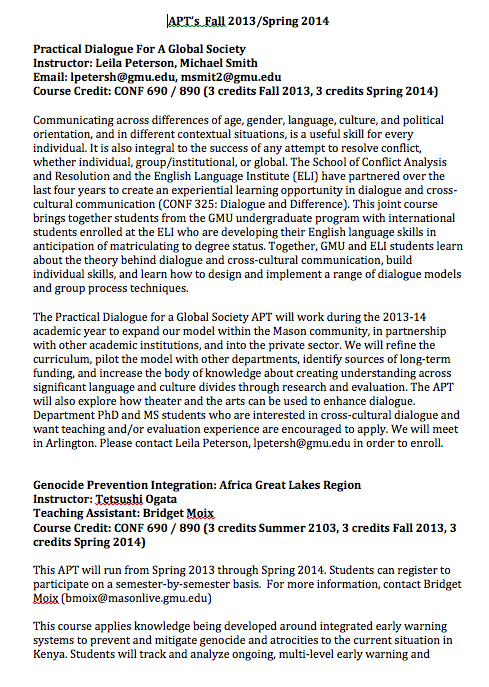The Applied Practice and Theory (APT) option is a 6-credit course for PhD and second year Master's students that runs concurrently in Fall and Spring semesters. The course is designed to take research and practices concepts presented in S-CAR classes into real situations with conflict and consequences. Students work in teams integrating research and practice with theory development and applied eithics.
CONF 890/690 Applied Practice and Theory Program
International APT
Dr. Karina Korostelina
Course Description: The purpose of the International APT course is to give students experience in understanding dynamics of conflict that include issues of violence, injustice, and discrimination as well as in building research and practice projects on conflict resolution. 
Students have the opportunity to learn field research in different cultural context, conflict analysis, research and intervention design, intervention processes, data analysis, evaluation, consulting, contracting, entry and exit. Inevitably, they also learn about themselves: their skills, their abilities to work in the ebb and flow of real conflict, their abilities to work in teams, their preferences in research and intervention style, and preferences for form of practice and research. Students find that lessons learned and capabilities built are not easy to articulate. Some students report that the knowledge only coalesced years after graduation.
Students should contact Dr. Korostelina at [email protected] with an email of interest prior to registering for the course.
Doctoral students and Master’s students who are in their final year and have taken the Research Methods course are encouraged to apply.
CONF 890/690 Applied Practice and Theory Program
South Caucasus Conflict Resolution Action Research: Implementing, Evaluating, and Innovating in Reconciliation Programs
Dr. Susan Allen
Building on grants to Mason for Georgian-Abkhaz and Georgian-South Ossetian confidence building  measures and people-to-people reconciliation, this APT team will engage directly in conflict resolution reflective practice and action research. While some parts of the project are already underway (see website: http://pointofviewdialogue.com/en/), APT team members will have opportunities to explore potential innovations in the practice, while learning through doing.
measures and people-to-people reconciliation, this APT team will engage directly in conflict resolution reflective practice and action research. While some parts of the project are already underway (see website: http://pointofviewdialogue.com/en/), APT team members will have opportunities to explore potential innovations in the practice, while learning through doing.
Each team member is encouraged to bring his/her preferred theoretical lens to the course, and to examine the utility of that lens in supporting conflict resolution practice throughout the course.
Students should contact Dr. Susan Allen at [email protected] with an email of interest prior to registering for the course.
Doctoral students and Master’s students who are in their final year and have taken the Reflective Practice course are encouraged to apply.
CONF 690/890 Applied Practice and Theory Course
Research and Practice: Community Conflicts in Centreville, Virginia
Dr. Julie Shedd and Lisa E. Shaw
 The Centerville Labor Resource Center (the only day labor center in Fairfax County) is deeply engaged with a community of approximately 1,000 immigrants from Guatemala. A majority of the immigrants are young men who use the resources of the labor center to secure work at fair wages. While most of the community speaks Spanish, the native language is the Ixil Mayan dialect.
The Centerville Labor Resource Center (the only day labor center in Fairfax County) is deeply engaged with a community of approximately 1,000 immigrants from Guatemala. A majority of the immigrants are young men who use the resources of the labor center to secure work at fair wages. While most of the community speaks Spanish, the native language is the Ixil Mayan dialect.
In the past two years relatively small arguments have become violent, and leaders of the community have reached out to ask for help in developing inter-community conflict resolution skills to help manage, prevent and transform conflict within the migratory community membership. Many of these members have been directly or indirectly impacted by the atrocities of the Guatemalan Civil War.
Additional Fairfax community based partners will include the county Labor Resource Center, Northern Virginia Mediation Services, Fairfax County Police and other Mason departments who will assist in developing conflict resolution capacity to this group.
This recently developed project will be developed in a team-based atmosphere with multiple S-CAR faculty members including Mara Schoeny, Patricia Maulen, Julie Shedd, Lisa Shaw and others who have expressed interest.
Students should contact Julie Shedd ([email protected]) or Lisa Shaw ([email protected]) with an email of interest prior to registration for the course.



